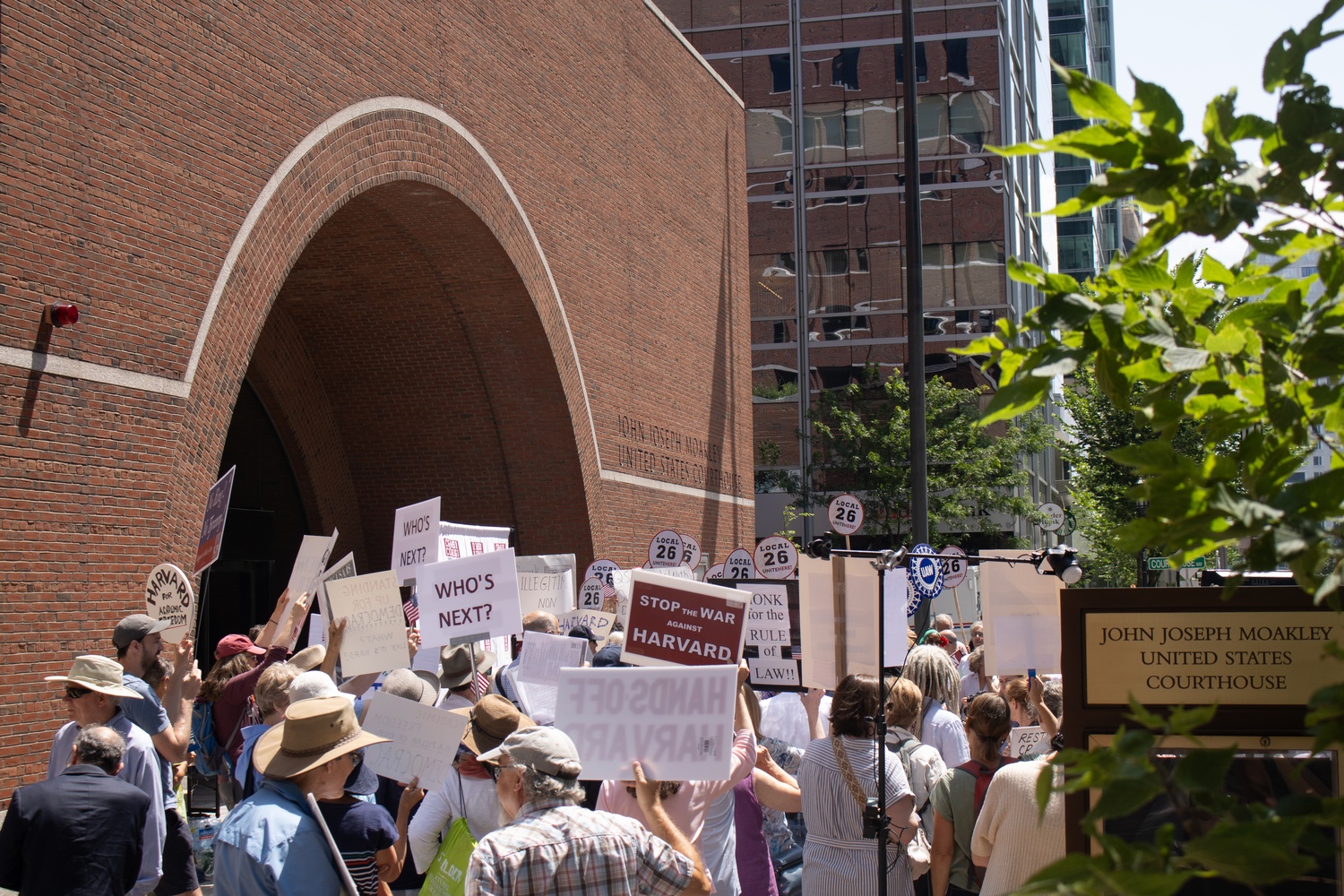
News
Summers Will Not Finish Semester of Teaching as Harvard Investigates Epstein Ties

News
Harvard College Students Report Favoring Divestment from Israel in HUA Survey

News
‘He Should Resign’: Harvard Undergrads Take Hard Line Against Summers Over Epstein Scandal

News
Harvard To Launch New Investigation Into Epstein’s Ties to Summers, Other University Affiliates

News
Harvard Students To Vote on Divestment From Israel in Inaugural HUA Election Survey
I’m a Non-Citizen Professor. Here’s Why I Testified Against Trump.
This July, I appeared in federal court, swearing to tell the truth, the whole truth, and nothing but. I had not planned on it. But given the opportunity, I had to take it.
Let me tell you how I got there and why it was so important.
I came to the US almost exactly 30 years ago as an international student from Germany on an F-1 visa. While I had that status, entering the country was a moment of anxiety and fear. Before reaching the border, I’d obsessively recheck all my documents and review in my mind whether I might have violated some rule, no matter how minor. And still, I would stand before the immigration officer, fumbling my documents, stammering through answers, sweat running down the back of my neck.
Most times, things went smoothly. But sometimes, an officer’s bad day meant invasive questions. And every time, it was clear that I was at the mercy of these agents with little or no recourse.
I stopped feeling that way once I received my Green Card. I felt like an American in all but the color of my passport. And I was glad for it. I love this country, for all its many faults. I was welcomed, found a career and identity I never could have imagined for myself before, found my family and built a life. I’m grateful for the freedoms America has given me, not just the formal ones enshrined in law, but the everyday lived experience of possibility.
But I started feeling the old fear and anxiety again earlier this year when the federal government began to target students associated with pro-Palestine advocacy, such as Mahmoud Khalil and Rümeysa Öztürk, for detention and deportation. Instead of only feeling worried and afraid for a couple of hours before entering the country, now it was almost constant. Might something I’d said or done light up a flag somewhere in the immigration bureaucracy? My first reaction to seeing my name in public was panic. At night, I’d lie awake reviewing the days.
Earlier this year, the American Association of University Professors brought a suit, AAUP v. Rubio, challenging the federal government’s ideological deportation policy on the grounds that it violates First Amendment rights. I had the opportunity to testify and give concrete, detailed descriptions of the effects of the government’s policy. Last week, U.S. District Court judge, Judge William G. Young ’62, handed down his ruling — an unqualified victory. As he wrote in his decision, non-citizens possess “the same free speech rights as the rest of us,” and "unequivocally" so.
We all know that the last word on this particular policy has not been said. But even if this case is overturned, or if no effective remedy is found, it’s vital that those of us who oppose the government’s policies and overreach keep on fighting. We don’t know what will break through and resonate with the public. We don’t know what unanticipated effects might come up. In our case, the legal team managed to unearth and make part of the public record shocking details about how the agencies involved made their enforcement decisions.
Deciding to testify was difficult. I spent a lot of time talking about it with my daughter since what I do affects her as well. But once I made the decision, I felt much better. My fear and anxiety lessened, and I could sleep through the night again. I had reclaimed at least some of my political agency. I did not simply have to keep my head down and hope that nothing bad would happen.
For it already had. None of us are going to come out of this unscathed. The fear and uncertainty felt in many communities today affects us all. That is the central premise of our lawsuit. We simply do not have a choice about whether we’re going to take a hit. We do have a choice about how to respond.
I joined the AAUP shortly after its Harvard chapter was founded because I wanted to connect with people who shared the values I hold dear — values that are under attack and need defending. I saw the opportunity to participate in the trial because of that connection. And because of that connection, I felt able to take a risk worth taking. I didn’t have to figure it all out on my own. There would be friends who affirmed the value of the fight, lawyers to prepare me for depositions and testimony, allies inside and outside the courthouse.
I am glad that I could re-learn this crucial lesson. Surround yourself with the right people. Stand in solidarity with them. Courses of action will make themselves known to you, along with the resources you need to follow through. Figuring out what to do isn’t something any of us needs to do alone.
Remembering this fact, along with seeing so many others insisting on their own agency and voice, has been a deep well of hope.
Bernhard Nickel is a Professor of Philosophy at Harvard University. He is a member of Harvard’s chapter of the American Association of University Professors (AAUP).
Want to keep up with breaking news? Subscribe to our email newsletter.

